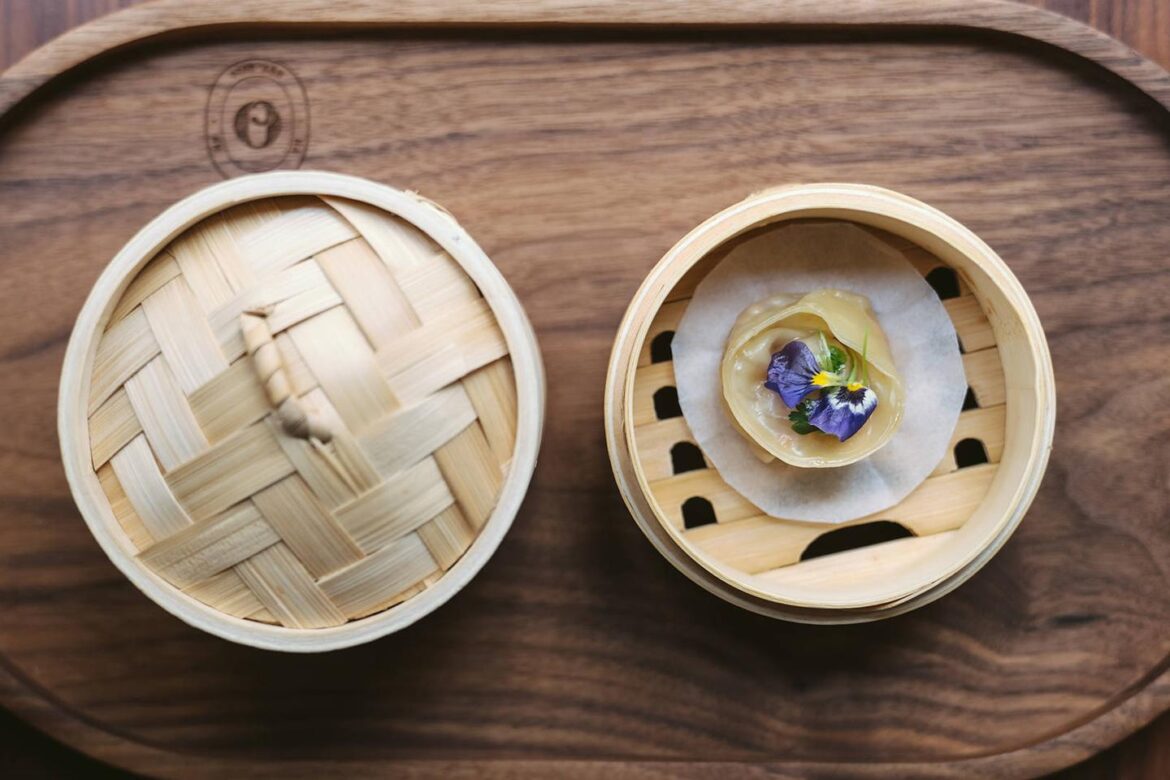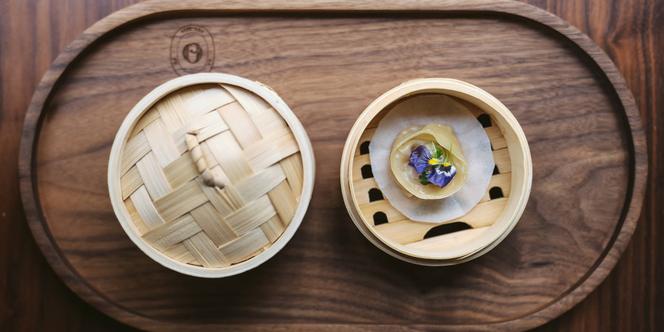 At the Octave restaurant, near the Trocadero, in Paris, on March 15, 2023. ANNE-CLAIRE HÉRAUD FOR “LE MONDE”
At the Octave restaurant, near the Trocadero, in Paris, on March 15, 2023. ANNE-CLAIRE HÉRAUD FOR “LE MONDE”
Walking through the door of the Kick Café in the center of Paris, one gets the feeling of entering a gigantic box of sweets. Candy pink walls, white chocolate pastries disguised as lollipops, shortbreads shaped like teddy bears, blue, green, purple cocktails topped with whipped cream, cookie powder and cotton candy syrup. It’s an accumulation of glucose that would make Hansel and Gretel’s gingerbread house jealous. The boutique café is the headquarters of K-pop fans. Moreover, at the back of the room, near cardboard silhouettes of stars, groupies in their twenties were blowing up balloons while munching on sesame cakes, currently the trend in Seoul. Their favorite band, CIX, was due to play at the Bataclan the next day. And it is here that music lovers from Orléans, Lille or Metz have chosen to meet to celebrate the event.
Singers and fans are not the only ones to stop by the Kick Café. A little over a year ago, the establishment welcomed Korean Culture Minister, Hwang Hee, who came to meet French K-pop fans. “I feel very supported by the country’s institutions,” said the café’s founder, Savannah Truong, 28, with a broad smile. She is assisted by the Korean Cultural Center, the embassy, Kocca (the agency for the promotion of trade and investment), and Kotra (the agency for creative content). “In November 2022, Kotra even paid for my trip to Seoul to learn about local coffees and products I could import.” After publishing a book about her homemade cocktails, K-pop Drinks (Hachette, 2022), the young boss feels supported enough to open another café in London this year. “I want to open 10 around the world!” she said without blinking.
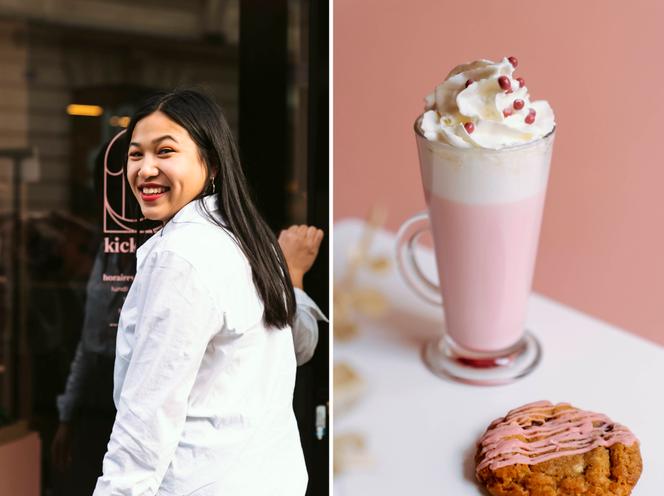 At the Kick Café, in the center of Paris, on March 15, 2023. On the left: founder Savannah Truong. Right: white chocolate raspberry vegan cookie and barbapapa latte. ANNE-CLAIRE HÉRAUD FOR “LE MONDE”
At the Kick Café, in the center of Paris, on March 15, 2023. On the left: founder Savannah Truong. Right: white chocolate raspberry vegan cookie and barbapapa latte. ANNE-CLAIRE HÉRAUD FOR “LE MONDE”
In France, cafés celebrating Korean culture have already spread: Joha Café in Lille, Café 750 in Bordeaux, Kiwa Café in Lyon. There are colorful pastries and oddities like bungeoppang, a fish-shaped cake filled with sweetened red bean paste. The number of Korean restaurants has also soared. According to the French-Korean media Francezone, they have increased from 40 to 200 in Paris alone in 20 years. In addition, there are more than 80 establishments in the rest of France.
Read more Subscribers only Fried chicken, hot wings and chicken waffles, ‘soul food’ coming to Paris from the South of the US
It’s not a massive increase, but it’s a big wave that has not happened by chance. K-food is a tool of the country’s soft power. The flagship of this influence campaign, the K-food Festival, is a gastronomic festival funded by the Korean Ministry of Agriculture which took place in July 2022 at Le Carrousel du Louvre, a symbolic location. There, visitors could learn how to make kimbap (a kind of rice roll filled with vegetables) and line up with hundreds of fans – most of them under 25 years old – to nibble on skewers coated with sweet and sour sauce or bingsu (a dessert made of crushed ice and red beans).
It would be wrong to dismiss the adolescent enthusiasm surrounding K-food because it has many assets to invite itself permanently onto our tables. First of all, it is inseparable from Korean pop culture, which is itself very powerful. “In music videos, TV shows and Korean movies, the stars eat all the time,” said Korean-born Walloon chef Sang Hoon Degeimbre, who has become an ambassador for the cuisine of his native country. “And their fans imitate them, all over the world.”
Following the global success of Squid Game, the recipe for dalgonas, caramels decorated with heart or umbrella designs that appear in the series, has gone viral. Meanwhile, director Bong Joon-ho’s 2019 Palme d’Or winner Parasite has boosted sales of jjapaguri, an instant noodle dish prepared in the film.
Passion for fermentation
Another strength is that Korean cuisine is based on fermentation, which has made a comeback in high-end restaurants. Sang Hoon Degeimbre uses his country’s ancestral techniques in his two-star restaurant L’Air du Temps in Liernu, in the Belgian province of Namur. “Our farm is in the middle of five hectares of vegetables,” explained the chef. “In winter, we serve them fermented, Korean style. We make pickles (jang-a-jji), soy sauce (ganjang), chili paste (gochujang).”
New
Le Monde’s app
Get the most out of your experience: download the app to enjoy Le Monde in English anywhere, anytime
Download
The Walloon chef’s table also includes kimchi, a mainstay of Korean cuisine, a powerful lacto-fermented mixture made from cabbage, chili and garlic. In France, William Ledeuil was one of the first Michelin-starred chefs to use it. “It allowed me to replace salt and pepper, which I try to stop using. I can use it as a condiment that adds a fragrant note,” he explained in his Ze Kitchen Galerie restaurant, one of the most renowned Asian-inspired eateries in Paris.
Pierre Sang, born in Korea and adopted at the age of 7 by a family in the Haute-Loire, has also contributed to familiarizing the French palette with Korean flavors. He uses kimchi to give “pep” to his dishes, especially the green lentils of Puy, a tribute to his adopted roots. His menu is very affordable: In his restaurant, the vegetarian bibimbap (a rice-based mixture, here enriched with lentils) is sold for €12.
Read more Subscribers only Tired of antiquated norms, some Japanese contemplate leaving home 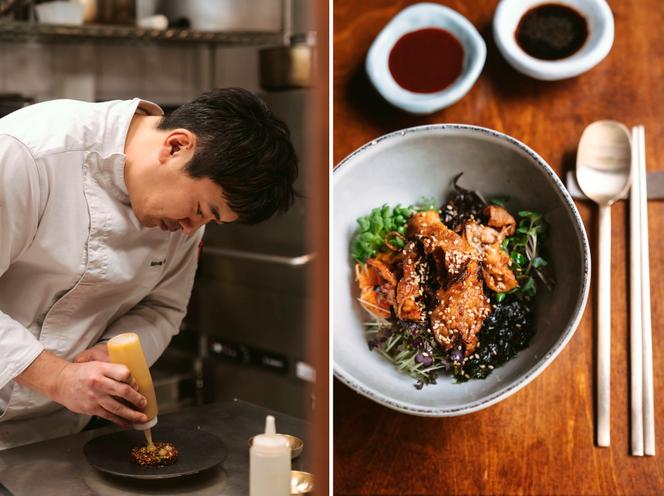 At the Perception restaurant, a new Parisian eatery near Pigalle, on March 15, 2023. On the left: chef Sukwon Yong. On the right: a bibimbap. ANNE-CLAIRE HÉRAUD FOR “LE MONDE”
At the Perception restaurant, a new Parisian eatery near Pigalle, on March 15, 2023. On the left: chef Sukwon Yong. On the right: a bibimbap. ANNE-CLAIRE HÉRAUD FOR “LE MONDE”
This is the other great strength of K-food: its accessibility. “The country, which has had a very low standard of living for a long time, has remained faithful to ‘poor people’s dishes’ from the vegetable garden,” explained Sang Hoon Degeimbre. “The Buddhist and vegetarian influence is still felt. And some street food is very popular.” Dong Né, a tiny Korean canteen in the 15th arrondissement of Paris, with a monastic decor (no posters or paintings, just a few wooden tables facing the open kitchen), is a good example.
The first menu, priced at €15, contains three delicious plates, each of which is enough for a full meal. On the menu, a variety of kimbaps, Korean rolls prepared before our eyes, containing carrots, cucumbers and radishes wrapped in a ring of rice (held together by a ribbon of dried seaweed). Then come the tteokbokki, sticks of rice flour dough dipped in a very spicy sauce. And finally, the fried sweet potato noodles. The freshness, the variety of textures and the range of flavors, from sweet to spicy, make it a very good meal at a very reasonable price, especially since the cooks can prepare dishes without animal protein.
Foie gras and miso
The conquest of French taste buds has been achieved more recently through a clever fusion with French cuisine, often subtle. At Perception, a new Parisian restaurant, located near Pigalle, whose dining room is similar to a black box, the menu is not immediately distinguishable from that of a bistro-type establishment. Except that the beet pie is spiced up with bokbunja (black raspberry fermentation), the sesame salmon comes to life with Korean celery pickles and the chocolate ice cream is flavored with nori seaweed.
“I wanted to bring as many people together as possible and for them to realize my influences only after they’ve eaten,” explained Sukwon Yong in the kitchen. After training in Korea and perfecting his skills at the international Le Cordon Bleu network of schools, the chef honed his French recipes with William Ledeuil, who helped him move to France. “The differences in technique between our cuisines are important,” explained Sukwon Yong. “Meat or fish stocks don’t exist in Korea. But there are also similarities. The flavors are varied, we like condiments and we take our time. For some game dishes, I can marinate the meat for 48 hours!”
Read more Subscribers only French factory implicated in Nestlé contaminated pizza scandal closes
At Octave, a stone’s throw from the Trocadero in Paris, the Franco-Korean marriage reaches new heights of refinement. Owner Juliette Ju, born in Seoul but living in France for the past 23 years, has an impressive culinary resume, including stints with Joël Robuchon and William Ledeuil (him again). Don’t be fooled by the discreet atmosphere of her gourmet restaurant, with its minimalist décor, tulips on the tables and sweet jazz melodies – the chef and her cuisine have character.
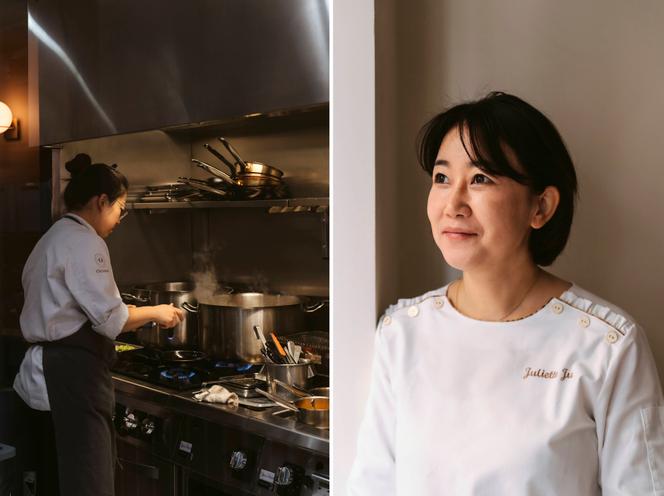 At the Octave restaurant, in Paris, on March 15, 2023. On the right: owner Juliette Ju. ANNE-CLAIRE HÉRAUD FOR “LE MONDE”
At the Octave restaurant, in Paris, on March 15, 2023. On the right: owner Juliette Ju. ANNE-CLAIRE HÉRAUD FOR “LE MONDE”
To whet the appetite, guests are invited to squeeze a pipette of spicy soy sauce onto a vegetable ravioli before an exquisitely delicate foie gras makes its appearance. “The liver has been marinated in miso,” she explained. “I use this soy paste as a seasoning instead of salt.” The rest is full of delights and surprises, like a mussel broth where grilled scallops splash around with green algae and a trio of cabbages (pointed, romanesco and Brussels sprouts). The Korean chef knows how to sublimate French dishes. The versatility of K-food seems to bring gourmets together and will prolong the “trend” for a few more centuries.
Read more South Korean crypto tycoon indicted for fraud by the US
Translation of an original article published in French on lemonde.fr; the publisher may only be liable for the French version.
Reuse this content

